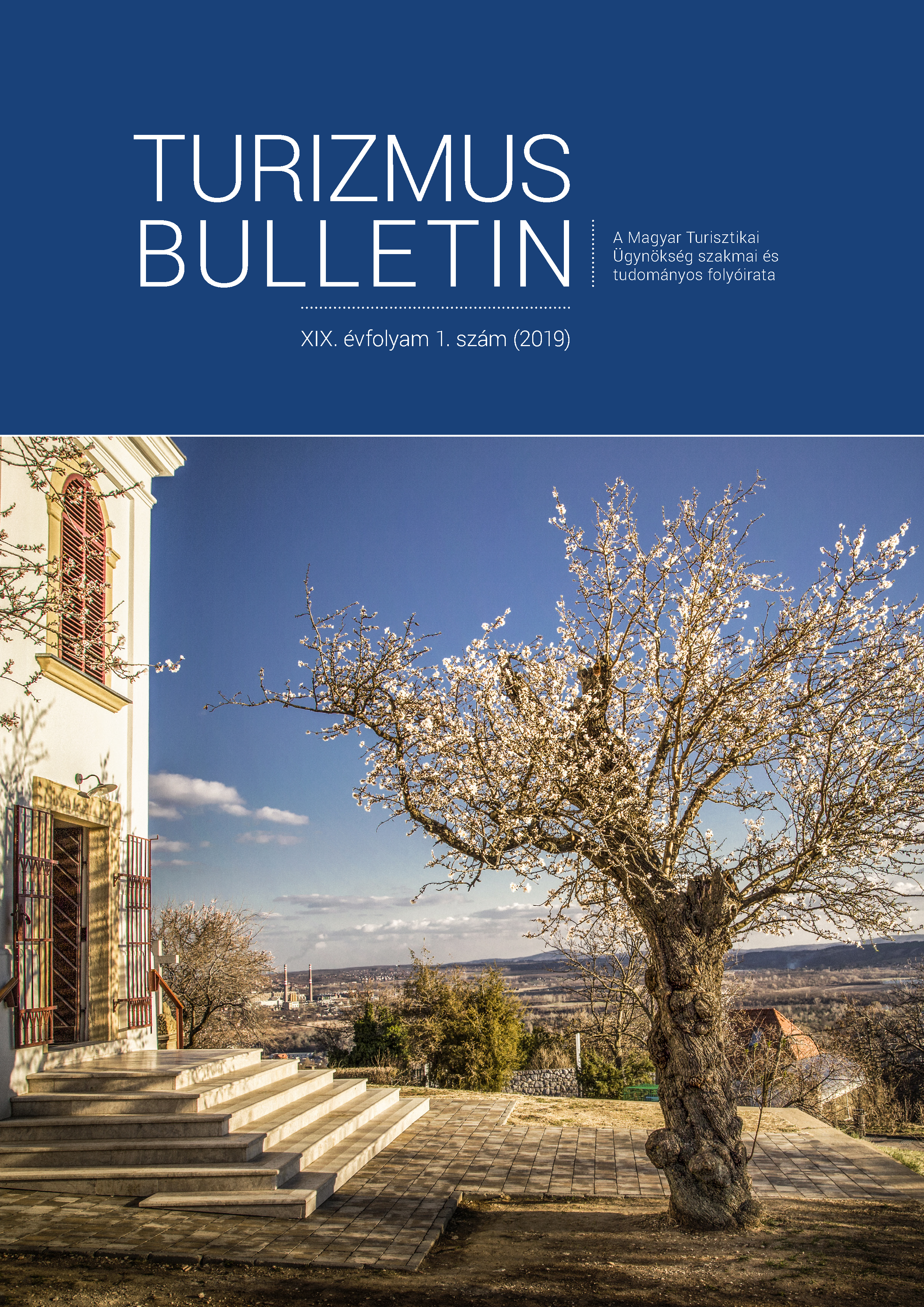Felelős turizmus, felelős döntéshozók, avagy CSR, ahogy a balatoni turizmusban érintett szereplők látják
DOI:
https://doi.org/10.14267/TURBULL.2019v19n1.3Keywords:
Balaton, társadalmi felelősségvállalás, CSR, felelős turizmusAbstract
A klímaváltozásnak, valamint az egyre inkább kimerülőben levő természeti erőforrásoknak köszönhetően növekvő trendet mutat mind a társadalmilag, környezetileg és gazdaságilag felelős turisztikai termékek terjedése, mind az irántuk mutatkozó kereslet. Mivel a turizmus erőteljesen a desztinációk természeti vonzerején alapszik, a környezetvédelem és a környezet megőrzése kiemelten fontos. Ugyanakkor a turisztikai vállalkozások felelősek az adott közösségért is, amelyben működnek. Ennek jegyében megfelelően kell kezelniük a turizmus természeti környezetre, valamint közösségre gyakorolt hatását. Ez a tanulmány a Balaton régió turizmusában érintett szereplők aktuális CSR-ral kapcsolatos nézőpontját vizsgálja.
References
BENAVIDES-VELASCOA, C. A. – QUINTANA-GARCÍAB, C. – MARCHANTE-LARA, M. (2014): Total quality management, corporate so-cial responsibility and performance in the ho-tel industry. International Journal of Hospitality Management. 41. pp. 77–87.
BEREZAN, O. – RAABA, C. – YOOB, M. – LOVEA, C. (2013): Sustainable hotel practices and natio-nality: The impact on guest satisfaction and guest intention to return. International Journal of Hospitality Management. 34. pp. 227–233.
BOWE, R. (2005): Going green: red stripe, yellow curry and green hotels. Environmental Magazine. 16(1). pp. 52–53.
CHAN, E. S. W. – HON, A. H. Y. – CHAN, W. – OKUMUS, F. (2014): What drives employees’ in-tentions to implement green practices in hotels? The role of knowledge, awareness, concern and ecological behaviour. International Journal of Hospitality Management. 40. pp. 20–28.
COMMISSION OF THE EUROPEAN COMMUNITIES (2001): Promoting a European framework for corporate social responsibilities. CEC: Brussels.
DODD, T. H. – HOOVER, L. C. – REVILLA, G. (2001): Environmental tactics used by hotel com-panies in Mexico. International Journal of Hospitality & Tourism Administration. 1(3/4). pp. 111–127.
FATMA, M. – RAHMAN, Z. – KHAN, I. (2016): Measuring consumer perception of CSR in tourism industry: Scale development and va-lidation. Journal of Hospitality and Tourism Management. 27. pp. 39–48.
FENNELL, D. (2001): A content analysis of ecotourism definitions. Current Issues in Tourism. 4(5). pp. 403–421.
FREY, N. – GEORGE, R.(2010): Responsible tour-ism management: The missing link betwe-en business owners’ attitudes and behaviour in the Cape Town tourism industry. Tourism Management. 31. pp. 621–628.
GAO, Y. L. – MATTILA, A. S. (2014): Improving consumer satisfaction in green hotels: The roles of perceived warmth, perceived compe-tence, and CSR motive. International Journal of Hospitality Management. 42. pp. 20–31.
GROSBOIS, D. (2012): Corporate social responsi-bility reporting by the global hotel industry: Commitment, initiatives and performance. International Journal of Hospitality Management. 31. pp. 896–905.
HAPP É. (2014): Fenntartható turizmus és felelősség-vállalás. Gazdaság és Társadalom. 6(1). pp. 90–102.
KIM, H. L. – RHOU, Y. – UYSAL, M. – KWON, N. (2017): An examination of the links between corporate social responsibility (CSR) and its internal consequences. International Journal of Hospitality Management. 61. pp. 26–34.
KRIPPENDORF, J. (1987): The holiday makers: understanding the impact of leisure and travel.Oxford: Butterworth-Heinemann.
KUCUKUSTA, D. – MAK, A. – CHAN, X. (2013): Corporate social responsibility practices in four and five-star hotels: Perspectives from Hong Kong visitors. International Journal of Hospitality Management. 34. pp. 19–30.
LEVY, S. E. – PARK, S.-Y. (2011): An analysis of CSR activities in the lodging industry. Journal of Hospitality and Tourism Management. 18(1). pp. 147–154.
LI, Y. – FANGB, S. – HUANC, T-C. (2017): Consumer response to discontinuation of corporate social responsibility activities of hotels. International Journal of Hospitality Management. 64. pp. 41–50.
MAGYAR ZS. – SULYOK J. (2014): Az ökoturizmus helyzete Magyarországon. Turizmus Bulletin.16(2). pp. 14–23.
MATHEW, P. V. – SREEJESH, S. (2017): Impact of responsible tourism on destination sustainabi-lity and quality of life of community in tourism destinations. Journal of Hospitality and Tourism Management. 31. pp. 83–89.
MICHALKÓ G. (2012): Turizmológia. Akadémiai Kiadó, Budapest.
MIDDLETON, V. (1998): Sustainable tourism – A marketing perspective. Oxford: Butterworth-Heinemann
PRUD’HOMME, B. – RAYMOND, L. (2013): Sustainable development practices in the hos pitality industry: An empirical study of their impact on customer satisfaction and intentions. International Journal of Hospitality Management.34. pp. 116–126.
PUCZKÓ L. – RÁTZ T. (2001): A turizmus hatásai.Aula Kiadó, Budapest.
REID, S. – JOHNSTON, N. – PATIAR, A. (2017): Coastal resorts setting the pace: An evaluation of sustainable hotel practices. Journal of Hospitality and Tourism Management. 33. pp. 11–22.
SINGH, N. – CRANAGEB, D. – LEEB, S. (2014): Green strategies for hotels: Estimation of recy-cling benefits. International Journal of Hospitality Management. 43. pp. 13–22.
SPENCELEY, A. – RELLY, P. – KEYSER, H. – WARMEANT, P. – McKENZIE, M. – MATABOGE, A. – N OR T ON , P. – MAHLANGU, S. – SEIF, J. (2002): Responsible tourism manual for South Africa. Department of Environmental Affairs and Tourism.
THEODOULIDIS, B. – DIAZ, D. – CROTTO, F. – RANCATI, E. (2017): Exploring corporate so-cial responsibility and financial performance through stakeholder theory in the tourism in-dustries. Tourism Management. 62. pp. 173–188.
TSAI, H. – TSANG, N. K. F. – CHENG, S. K.Y. (2012): Hotel employees’ perceptions on cor-porate social responsibility: The case of Hong Kong. International Journal of Hospitality Management. 31(4). pp. 1143–1154.
WEEDEN, C. (2001): Ethical tourism: an oppor-tunity for competitive advantage. Journal of Vacation Marketing. 8(8). pp. 141–153.
WORLD BUSINESS COUNCIL FOR SUSTAINABLE DEVELOPEMENT (1999): Corporate social responsibility: Meeting chang-ing expectations. Geneva.
Internetes források
GONDOS B. (2017): Turizmus és életminőség kap-csolata a mozgáskorlátozottak körében. https://kgk.sze.hu/images/dokumentumok/kautzki-advany2017/Gondos_Kautz_2017.pdf Letöltve: 2018. augusztus 10.
KSH (2016a): Jelentés a turizmus és vendéglátás 2016. évi teljesítményéről. http://www.ksh.hu/docs/hun/xftp/idoszaki/jeltur/jeltur16.pdf Letöltve: 2018. április 6.
KSH (2016b): Turizmusgazdaság a Balaton idegenforgalmi régióban. http://www.ksh.hu/docs/hun/xftp/idoszaki/regiok/veszpremturizmusgazd.pdf Letöltve: 2018. április 6.
www.planeta.com

